
A new wave of violence in Cairo’s Tahrir Square began Friday when one of several hundred peaceful protesters staging a sit-in outside the parliament building was reportedly detained and beaten by troops. Up to 14 people have now been killed and hundreds injured over the last three days of clashes. A video uploaded Sunday on YouTube has circulated widely and provoked outrage at the extent of police brutality. It shows a young woman being dragged and beaten by military police. The top half of her body is bare, her blue bra exposed. Her abaya, or robe, has been ripped off and surrounds her upper body, showing that she was wearing a hijab. “When this [woman was beaten and disrobed] happened, there was probably much more video evidence of people being brutally beaten down, but they’re not available, because the army, right after that raid, entered the offices of most media outlets surrounding the square and confiscated equipment,” says Democracy Now! correspondent Sharif Abdel Kouddous, reporting from Cairo. Kouddous says the military confiscated two of his cameras, and he also saw them take cameras from Al Jazeera reporters. “This was a clampdown on information, on trying to prevent these kinds of pictures from emerging.” The police attacks have overshadowed the first parliamentary elections since former president Hosni Mubarak was ousted in February. [includes rush transcript]
Transcript
AMY GOODMAN: We turn now to Egypt, where violence in Tahrir Square began Friday when one of several hundred peaceful protesters staging a sit-in outside the parliament building was reportedly detained and beaten by troops. Up to 14 people have been killed, hundreds injured, over the last three days of clashes.
A video uploaded yesterday on YouTube has circulated widely, provoked outrage at the extent of police brutality. A young woman is seen being dragged and beaten by military police. The top half of her body is bare, her blue bra exposed. Her abaya, or robe, has been ripped off and surrounds her upper body, showing that she was wearing a hijab.
The violence has overshadowed the first parliamentary election since President Hosni Mubarak was ousted in February. According to Egypt’s Higher Elections Committee, turnout was high for the second round. Egypt’s two leading Islamist parties said yesterday they secured about three-quarters of votes, extending their lead in the three-stage vote. Based on results of most districts, a source from the Muslim Brotherhood’s Freedom and Justice Party said it was on track to win about 40 percent of the vote. Speaking at a news conference yesterday, the head of Egypt’s High Elections Committee expressed regret at the incidents over the weekend.
ABDEL MOEZ IBRAHIM: [translated] We announced to you the results of the first round of the second stage of the elections. We have experienced unfortunate circumstances, events that are incomprehensible. We ask God to welcome the martyrs into heaven and to give comfort and patience to their families, and to give a quick recovery to the injured.
AMY GOODMAN: To find out more about what’s happening in Egypt, we’re going to Cairo now to speak with Democracy Now!’s Sharif Abdel Kouddous.
Sharif, welcome back to Democracy Now! Talk about what happened this weekend.
SHARIF ABDEL KOUDDOUS: Well, Amy, we’ve seen a real escalation of violence in the streets of downtown Cairo. After four days of clashes, at least 14 people are dead, more than 700 are wounded, 200 have been arrested. This all started really on Thursday night, early Friday morning, when a sit-in that had been held in front of the offices of the cabinet, of the government of Kamal El-Ganzouri, and the parliament—that sit-in began nearly a month ago, in protest of the appointment of Kamal El-Ganzouri, who served as prime minister under Mubarak and was appointed after Essam Sharaf, the former prime minister, resigned in the wake of previous clashes last month, also in downtown Cairo, that led to the killing of up to 45 people. Since that time, when those clashes died down, we’ve seen the elections begin, take place. As you mentioned, the Muslim Brotherhood is doing very well, capturing about 40 percent of the seats. But we’ve also seen a crackdown on activists that’s not been reported widely. A number of activists have been kidnapped by security forces, beaten, interrogated, and then let go. So this is the context in which this was happening.
And as you mentioned, a young protester who was part of the sit-in, by the name of Aboudi, was captured by security forces—by armed forces, rather, the army. They took him into the parliament building and beat him severely for two hours. If you look at the video of his face, when I first saw it, I thought he had died. His eyes were swollen shut, and he was beaten very badly. So, when they dumped his body on the street and he was—people saw him, this sparked clashes with the armed forces. What happened was that the military began attacking also protesters in a very bizarre way, standing on the roof of the cabinet building, on the roof of the parliament, hurling down stones, throwing chairs. They threw a cabinet down. They threw china on the protesters. And then they—protesters responded with rocks and sometimes Molotov cocktails. The army stormed the streets, very brutally beating people with wooden sticks. Those who did not get away or fell down were beaten on the floor and then taken into the parliament building and abused some more. I saw people getting carried out. And this includes elderly women, women young and old being carried out, some of them beaten so badly they could hardly walk. So, this was the context of what was happening.
And these clashes continued to escalate into Saturday. And what happened on Saturday was, the army began to try and build a wall on Kasr Al Aini Street, which leads to parliament, which leads to cabinet, which was the site of most of the protests. And they were partially building this wall, but clashes broke out again. And the army conducted a very, very brutal raid into Tahrir, and they forcibly moved the protesters and cleared all of Tahrir Square. I, myself, was there on the ground when it happened and was forced to run very fast. And this is that video that you mentioned and you probably showed of that woman being very brutally beaten by three or four soldiers, army soldiers, on the ground, being kicked, being stomped. Her abaya is ripped off, and her body and chest are exposed. Other people are clearly shown on video being very brutally beaten.
And let me just say, when this happened, there was probably much more video evidence of people being brutally beaten down, but they’re not available, because the army, right after that raid, entered the offices of most media outlets surrounding the square and confiscated equipment. The apartment that I ran into of a friend of mine, I found—we were filming from a balcony on the ninth floor. I suddenly found an army soldier on the balcony demanding the cameras. They took two of our cameras away. When I went down to try and retrieve them, I myself was almost arrested. And I saw other soldiers throwing equipment from Al Jazeera, who had rented a room, off the balcony into the street. So, this was a clampdown on information, on trying to prevent these kinds of pictures from emerging.
But as it stands right now, the clashes continued. They built a third wall on Sheikh Rihan Street, which is another street leading to Tahrir. So, right now, there’s three walls blocking main arteries into Tahrir, the third one being one that was built last month. And it’s almost as if the army and the Ministry of Interior and the government are on one side, and the revolution is on the other, and they’re being separated by these physical barriers. And right just before we went to air, the Supreme Council of Armed Forces held a press conference completely denying any wrongdoing, completely denying even the use of violence against protesters, in contradiction to clear video evidence, and saying that the people protesting are not part of the revolution. And so, and they also showed video supposedly supporting their claims, even showing young children apparently confessing to being forced to engage in the protest—a really macabre scene that just unfolded on TV. So, that’s the context of what’s happening right now, and it’s taking place as elections for the parliament are supposedly underway.
AMY GOODMAN: Sharif, talk about the significance of these elections. Talk about the Salafists, the Muslim Brotherhood taking the enormous lead that they have, especially the Salafists surprising many. And who are the people who are protesting in Tahrir?
SHARIF ABDEL KOUDDOUS: Well, the people who are protesting, many of them are the people who started this revolution on January 25th. Many of them are the people that protested for years leading up to it. Many of them are angry youth, that the revolution has been stolen from them. I mean, if we look at what happened since January 25th, when this whole—when this revolution began, really none of the revolutionary demands have been completed. The security forces have not been—have not been reformed. No police officer has been put on trial, or any soldier put on trial, for killing of protesters. And that these revolutionary demands for bread, freedom and social justice, people feel have all but been abandoned. And so, that’s what many of the people are calling for.
And let me just say that, of these 200 people, nearly 200 people who are in detention right now, that are being accused of crimes of inciting violence and burning buildings, many of them have been—have broken arms, are very badly beaten. They’re being refused medical attention. And one of them actually just died after being refused medical attention. And so, this is happening while the army is claiming that no violence is being conducted.
And one of the people who was killed, actually—let me add also, most of these people who have died—of the 14 who have died, most of them have been killed by live ammunition. And one of them was a sheikh from Al-Azhar, which is the most important religious institution in Egypt. He was the chief of staff to the Grand Mufti. And he was killed. And on Saturday, there was a massive burial service for him and a massive march that came to Tahrir, as well. So, this is a serious development in and of itself.
AMY GOODMAN: And—
SHARIF ABDEL KOUDDOUS: But with regards to the elections, as you mentioned, the—go ahead.
AMY GOODMAN: Go ahead.
SHARIF ABDEL KOUDDOUS: Just with regard to the elections, as you mentioned, the Muslim Brotherhood has captured about 40 percent of the seats. The real surprise has been the ultraconservative Salafis, who have made very big gains. And liberal parties have come a very, very distant third. And revolutionary youth parties have captured almost a negligible amount. The Muslim Brotherhood has not really participated in these protests whatsoever. They want the elections to go forward as planned, because they stand to gain the most from them. And they are being very severely accused by the revolutionary youth of political opportunism in the face of a real clampdown by the army 10 months after this revolution began.
AMY GOODMAN: This was the weekend, Sharif, the first anniversary of Mohamed Bouazizi, the Tunisian man who was—who self-immolated, protesting the authorities cracking down on him and the lack of opportunity in Tunisia, burning himself to death. Was there a marking of this in Egypt? Many say that Mohamed Bouazizi’s act sparked the Tunisian revolution, which sparked the Egyptian revolution, which sparked so many uprisings around the country—around the world and in this country, as well, Occupy Wall Street.
SHARIF ABDEL KOUDDOUS: Well, it was certainly noted. I mean, the anniversary came in the midst of—really in the midst of these very violent clashes. I think people noted and paid respects to Mohamed Bouazizi as a martyr of the revolutions that began, but that I think many people here in Egypt feel are very much largely unfinished. And the fact that the road leading to parliament, that the road leading to the cabinet and to the People’s Assembly that is being elected right now, is—was being—people were standing on top of it, and soldiers were throwing and attacking protesters from atop this building, that hundreds of people were held—
AMY GOODMAN: Five seconds.
SHARIF ABDEL KOUDDOUS: —in the parliament building and beaten and tortured, and that there’s a wall separating people from these buildings, I think says a lot about where the revolution is and where it has to go.
AMY GOODMAN: Democracy Now!’s Sharif Abdel Kouddous, thank you so much, speaking to us from Cairo.

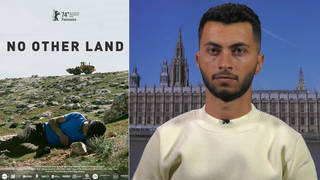
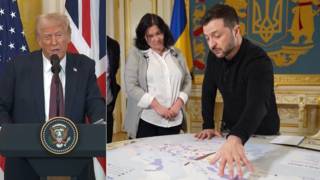
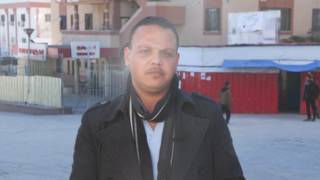
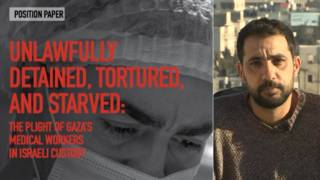





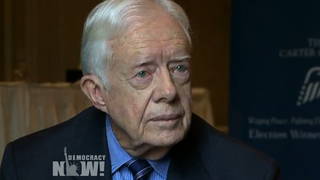

Media Options